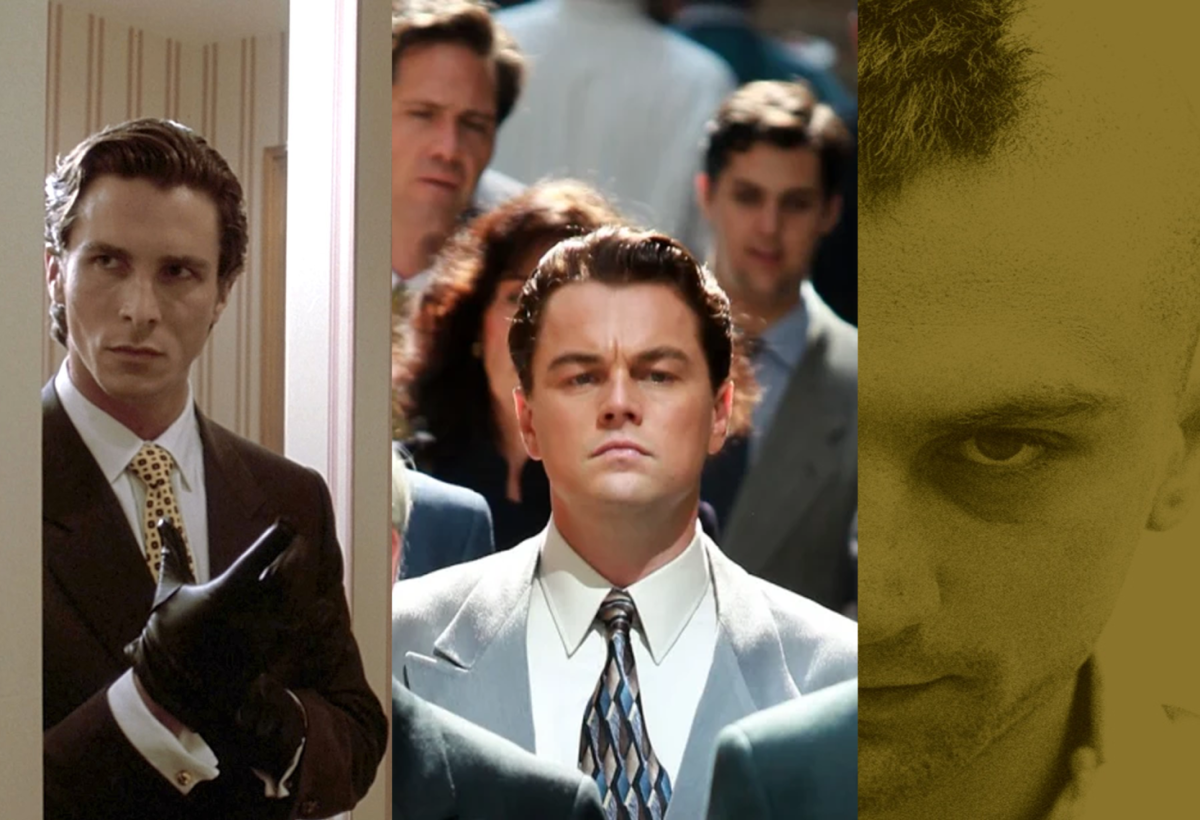Loneliness has followed me my whole life. Everywhere. In bars, cars, sidewalks, stores. There’s no escape. I’m God’s lonely man (Taxi Driver 1976). Brilliant movies with layered meanings and artistic depth have been spoiled by the corny and tone-deaf “sigma male community.” These stunning pieces of art have become misinterpreted and consequently ruined by those who use these films as self-persuasion.
Movies like American Psycho (2000), The Wolf of Wall Street (2013), and Taxi Driver (1976) have made a resounding comeback into mainstream culture. These films have not only achieved critical acclaim but have also become emblematic of a recent trend known as the ‘literally me’ film.
These movies are characterized by their solitary male protagonists, themes of violence and hedonism, a sense of disillusionment with the world, and a critique of materialism and masculinity. They have found an audience among meme creators and earnest followers of ‘sigma male’ culture, predominantly attracting male enthusiasts who relate to or admire the characters, some of whom have even become iconic and inspirational figures.
Let’s clarify what a sigma male is. The term, coined by a far-right activist in 2010, has gained prominence relatively recently. In the realm of ‘alpha males,’ the sigma male is perceived as the ultimate pinnacle of success. Often linked with the misogynistic online community, the sigma male embodies qualities of strength, wealth, discipline, and individualism. This “movement” offers no space for women except to be tallys of a man’s personal success, which is incredibly ironic considering most of these “men” probably live in their mother’s basement.
American Psycho is perhaps the most prominent film associated with this phenomenon.. The character of Patrick Bateman, portrayed by Christian Bale, is a sadistic murderer, deeply insecure despite his outward bravado-hardly ideal role model. It’s disconcerting to see film clips of Bateman in sharp suits on sigma male motivation pages.
While Bateman may superficially fit the “sigma” mold, it’s the tension between his external facade and internal struggles that drives the film. He hides behind a mask of expensive beauty products, glamorous women, and cold charisma, driven by fear of losing the status he’s attained through conformity. Bateman is a victim of the consumerist and corporate culture often promoted on these pages, and his primary goal is to ‘fit in’ with the very people he despises.
The allure of Bateman’s character seems to stem from the selective removal of context. When you overlook the fact that he and the other main characters of these movies are deeply damaged and damaging individuals, they appear admirable in many ways. It’s easy to miss the satirical aspects and see Bateman as a man who will do whatever it takes to succeed, spouting lines that can be posted on your motivational Instagram.
Oscar-winning movie Taxi Driver (1976) explores similar tensions among its lead characters, and receives the same misrepresented clout. Its main character is so neglected by his society that he willingly engages in criminal activities. Clearly, that’s a “literally me” moment. Though the voice-overs of Travis Bickle (Robert Deniro) narrating his life and his workout regime are moving, many audience members don’t realize that these characters are anti-heroes and not role models. The movies are supposed to be self-aware and deconstruct themselves, while also maintaining a first-person narration. In truth, the characters are not sigma males, but insecure outcasts trying to justify a rather pathetic existence.
Characters in the movies often drown themselves in alcohol, women, and violence as an escape from their lives. Contrarian personalities, loneliness, and a tough exterior are a way to compensate for the pain one has gone through. The disdain for ones around them and the ‘sigma’ mentality is not admirable, but rather a consequence of our societal norms. It holds up a mirror almost to say, “Look at what you have done to our young men.”
The Wolf of Wall Street presents a complex case in this regard, straddling a fine line between obvious satire and troubling indulgence. Leonardo DiCaprio stars as the real-life entrepreneur and financial criminal Jordan Belfort, a character who is morally corrupt and obsessively materialistic, yet portrayed with a charm that makes him undeniably appealing. The film is a masterful character study, but its depiction of Belfort’s extravagant lifestyle often overshadows its intent.
The real-life Belfort, released from prison in 2006, has become a motivational speaker and author, targeting an audience primarily composed of sigma males and similar groups. The film has only amplified Belfort’s fame, leading more people to seek acquiring obscene wealth, with scant regard for ethics, as the epitome of success. While the director Martin Scorsese may not have intended for this outcome, the film’s morally ambiguous stance has created a potentially hazardous legacy.
The film isn’t just controversial for its portrayal of Belfort; it also casually shows the objectification of women. The character of Naomi, portrayed by Margot Robbie, exemplifies the latter, with her sex appeal being her most notable characteristic. Although the film invites sympathy for her character, she spends most of her screen time being objectified both by other characters and the camera. Belfort views her as a trophy to be won, showing little concern for her feelings. To Belfort and Sigma males, women exist for sex and nothing more. This is an insanely problematic stance to normalize considering we aren’t in a brothel in the 1900s.
In all three of the films mentioned, the male protagonists use and exploit the women around them, often through forms of sexual harassment. While attracting the most beautiful woman in the room may be desirable, it’s worth scrutinizing how much of these characters’ desires are rooted in objectification, a desire for possession, or the perception of women as mere status symbols.
While appreciating evil characters or taking them out of their original context isn’t inherently problematic, ignoring or romanticizing their vile nature to make them into heroes certainly is. In fact, romanticizing these characters ironically enables our society to worsen. Assigning irredeemably despicable characters as “sigmas”, completely overlooks the meaning of the work. Regardless of what you might find on the internet, hacking Jared Leto with an ax is unlikely to be a solution to anyone’s problems.




